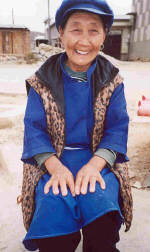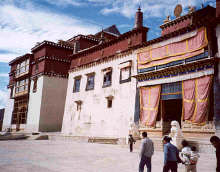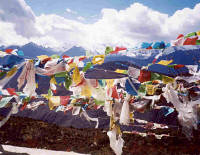Zhondian


Zhondian lady
![]()
![]()
In the morning, Ge Sa, our local guide, tall and broad-shouldered, strode confidently into the Pacific Rim Hotel lobby. He was nineteen-years-old and spoke no English.
His thick wavy hair, stylishly cut, framed a perfect porcelain face. He wore local dress, a silk embroidered shirt with shoulder buttons and jeans rather than blousy gaucho-style pants that normally complemented his traditional outfit. He carried a dagger and his tea thermos.
For the first time on the trip, I was frustrated: we were lucky to tumble into this mountainous corner of Yunnan, relatively unfamiliar to Americans, but unlucky to be greeted by a non-English speaking guide (unlike the lower-paid hotel waitresses who could speak English fairly well).
During the next three days, we gleaned ‘bits and pieces’ thanks to Norman’s translations:
Which leads me to some questions about travel. How much real and accurate information can a guide convey to visitors? How much truth remains in the visitor’s retelling of his experience?
Once, a South African guide explained to us how a common native tree’s name in Kwa’zulu translated to the “I don’t know” tree. It’s a classic example of how lack of communication between guides and the earliest settlers could have been misinterpreted, recorded, and preserved throughout history.
Fortunately, Ge Sa could share some of his knowledge of the mountains and its medicinal plants, with which he was well acquainted, by simply picking the white strands of snow tea pushing through frozen grasses.
Sooner or later, one runs into obstacles on any trip. In many cases, the obstacle to having a good time turns out to be yours truly. I tried to remind myself of this as the dynamics of our nuclear group changed. Rather than four people, we were five.


Songzanlin Monastery
![]()
![]()
Although Ge Sa was the youngest of the group, he set the pace and tone of our visits as he whisked us through the Songzanlin Monastery (Yunnan Province’s major Buddhist monastery). The monks that we had been told would be eager to talk to Americans did not approach us except to borrow our guide’s cellular phone. We received a blessing from the yawning lama. We seemed to walk in an invisible cloud.
I don’t know exactly when the realization began to sink in…this is NOT Shangri-la…maybe while wandering along one of Zhondian’s windswept streets or walking down the 105-step log path to the lapping edge of sacred Bitahai Lake. A “Happy Birthday” tape recording broke the quiet of the surrounding forests.
Ge Sa picked us up in the evening to visit a Tibetan home. The taxi driver dropped us in front of a large wooden chalet well-lit for the visitors. Young women bringing glasses of local barley brandy greeted us at the front gate (one is supposed to snap fingers, dip a finger in the brandy before drinking).
When we entered the house, we were surprised to see many of the Pacific Rim hotel guests seated around a fireplace, all facing the center of the large high-ceilinged room. Each guest received a bowl of yak butter tea (one should drink two bowls of yak butter tea – any less is impolite) and a variety of local cheeses, yak meat, etc. Several teenage girls and a boy in Tibetan attire formed a circle and began to sing and dance. Ge Sa joined the troupe, then grabbed a microphone to sing. His voice poured forth, smoother than yak butter tea. He yanked Norman from his stool, urging him to link hands with the dancers.
I studied the other guests’ impassive faces as they gazed in a stupor at the teenagers kicking up their heels. They didn’t appear impatient or edgy as I was feeling. Was it the touristy aspect of yet another folkloric song and dance session that dismayed me? Or was I succumbing to thin air and Larium side effects?
I kept peering around corners expecting to see the Tibetan family I had imagined – where were Grandma and the kids? A gracious woman, perhaps the owner, worked behind the scenes to make sure everyone had plenty of tea, brandy and yak meat.
The smoke from the fire switched directions and billowed over us. I moved closer to the front door, then nudged Norman gently. “Norman, let’s go before someone asks us to sing!” When we stood up to leave, the other guests followed.
I looked for the gentle-faced woman to thank her, so she could close the door, turn off the lights and go back to her real life.
When we returned to our room at the Pacific Rim, we couldn’t turn on the heat that had worked so efficiently the previous night. Suddenly, nothing seemed to be working.
The following morning, Mr. Zhang greeted us with his perpetual smile and good-natured calmness. Ge Sa rode beside him in the front while Norman, Chris and I squeezed into the back seat for our 125-mile drive to Deqen.
Mr. Zhang spun through downtown Zhondian. He hailed his wife who peddled her bicycle toward the local school. She wore a face mask to filter out the street dust. Their daughter held tightly onto her mother’s waist. In a flash, Dad scooped up the girl and set her between himself and Ge Sa. We dropped her at her primary school, a modern cinder block complex where neatly-dressed kids filed through the front gate as older kids monitored their arrival. This was what we had been looking for in Zhondian – just plain old day-to-day life.
The sun continued to shine brightly as it had since our departure from Lijiang. We were driving out of town, when a pheasant shot cross our path. Mr. Zhang slowed the jeep and whooped with delight at the good omen, noting exactly where the Tibetan pheasant sought cover.
Each day brought us closer to Meili Snow Mountain, also known as Prince Snow Mountain. Its most famous peak, Kagebo at 6,470 meters (21,221 feet) has yet to be conquered. Those who have tried (most recently in 1991) have lost their lives.
Every cutback unveiled more spectacular stretches of dense forestland which ceded to a canopy of rock-cradled glaciers.
In Benzaling, the halfway point between Zhondian and Deqen, we stopped for lunch at a roadside restaurant. An old man carrying a chicken walked in from the street. He and the chef slit its throat over a bowl to catch the blood. Then they haggled over the size of a fish he would take in exchange for the chicken. The chef lifted a concrete block from the kitchen floor where several fish swam around in an underground water vat. After a heated discussion, the old man took his fish and left. “Fish is expensive,” Norman explained.
Norman and Ge Sa ate the fresh chicken soup while Chris and I attacked the tofu and vegetables I had pointed to in a refrigerated case by the grill. After lunch, the main meal of the day, we watched television and the chef joined us.
She and I sat across from one another and ‘chatted’ while we sipped beer and tea. I pointed admiringly to her 24 karat gold jewelry. “Beautiful!” She smiled even though she may not have known the Chinese translation. Yes, women CAN talk jewelry in ANY language!
Outside, on Benzaling’s main street, a long-haired young father carried his son proudly on his muscular shoulders. I spotted a blonde-haired foreigner in the street. Being nosey, I stepped outside to greet her. “You’re an American?” I asked, somewhat surprised to run into another American, so soon after September 11th.
“I’m from Missouri, but I’m staying in Deqen,” she replied. “I’m a botanist working for the Nature Conservancy. We’re trying to keep track of which medicinal plants may have been depleted in the highlands.”
She was accompanied by a Chinese botanist who spoke excellent English. Everywhere, we saw signs that conservation issues were being addressed as tourism grew in this area. Hotel rooms requested tourists to use fewer towels. Norman told us that recent legislation forbade forest strip-cutting in the region.
After lunch, the best part of the drive commenced. We twisted our way ever upward, nothing but Mr. Zhang’s expert driving shielding us from the steep drop-off to the forested valleys. When we paused for photos at 16,000 feet, I knew that no photo could duplicate the clarity of the mountain air.


Prayer flags outside Deqen
![]()
![]()
Before entering Deqen, we stopped at a stupa that marks the entrance to the city and overlooks the glistening mountain peaks swathed in clouds. Multi-colored prayer flags shimmered against the blue skies. As we gazed at the sacred snow-covered mountains, a Beijing government official’s motorcade approached. Local politicians greeted the VIP, shook hands, and served the traditional barley brandy. We waited for the motorcade to proceed, then headed into town, minus the fanfare.
So, it was quietly that we hunkered in for the night beside the haunches of the mighty Prince Meili Snow Mountain. Late in the night, a familiar voice yodeled and trilled. Was Ge Sa singing love songs?